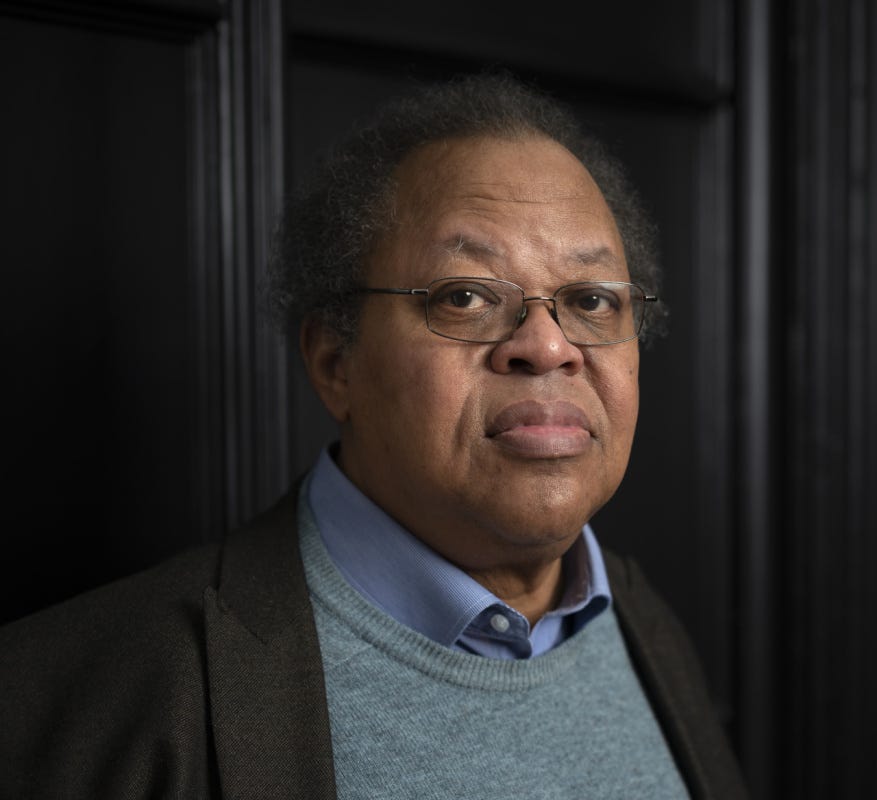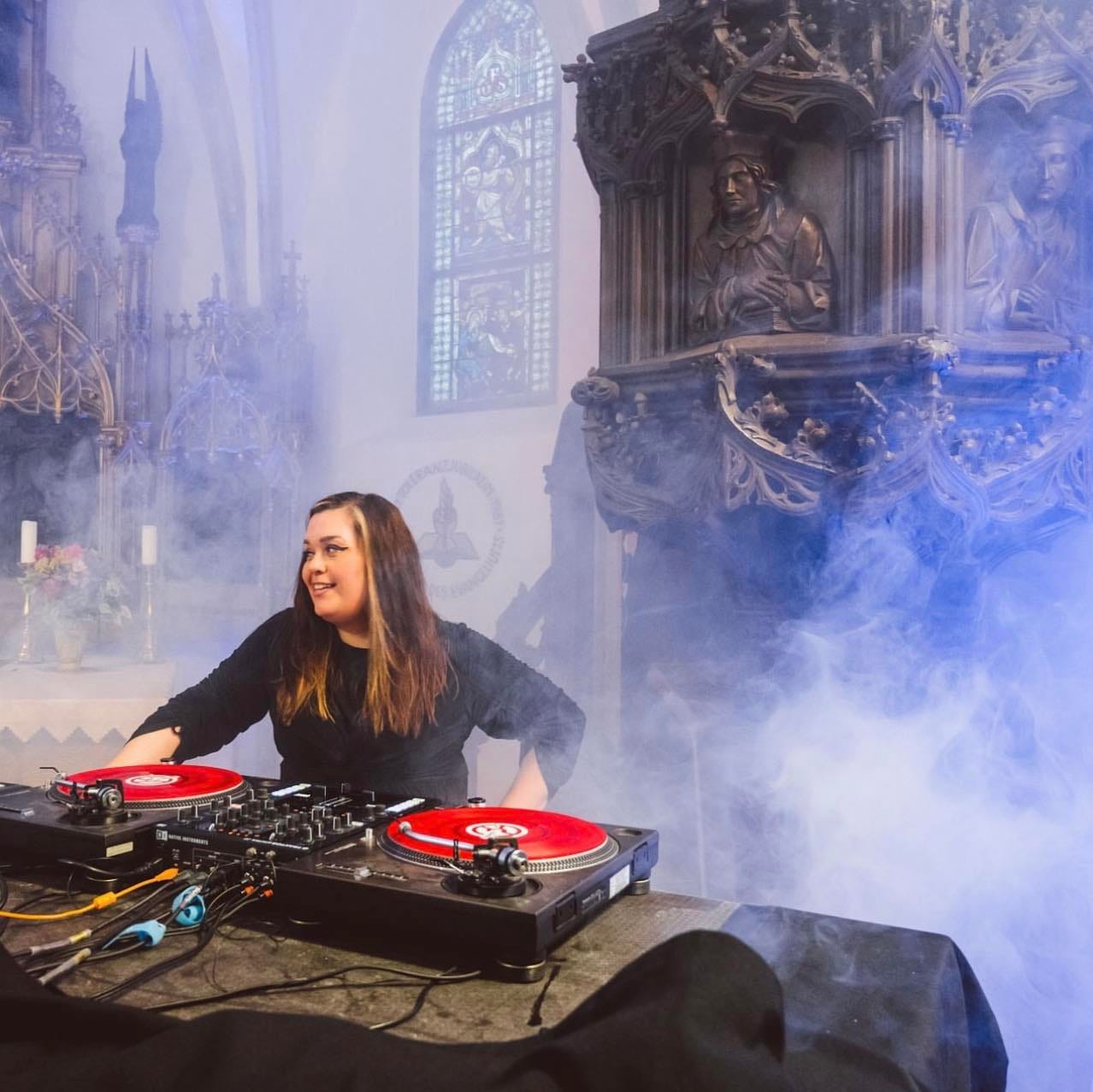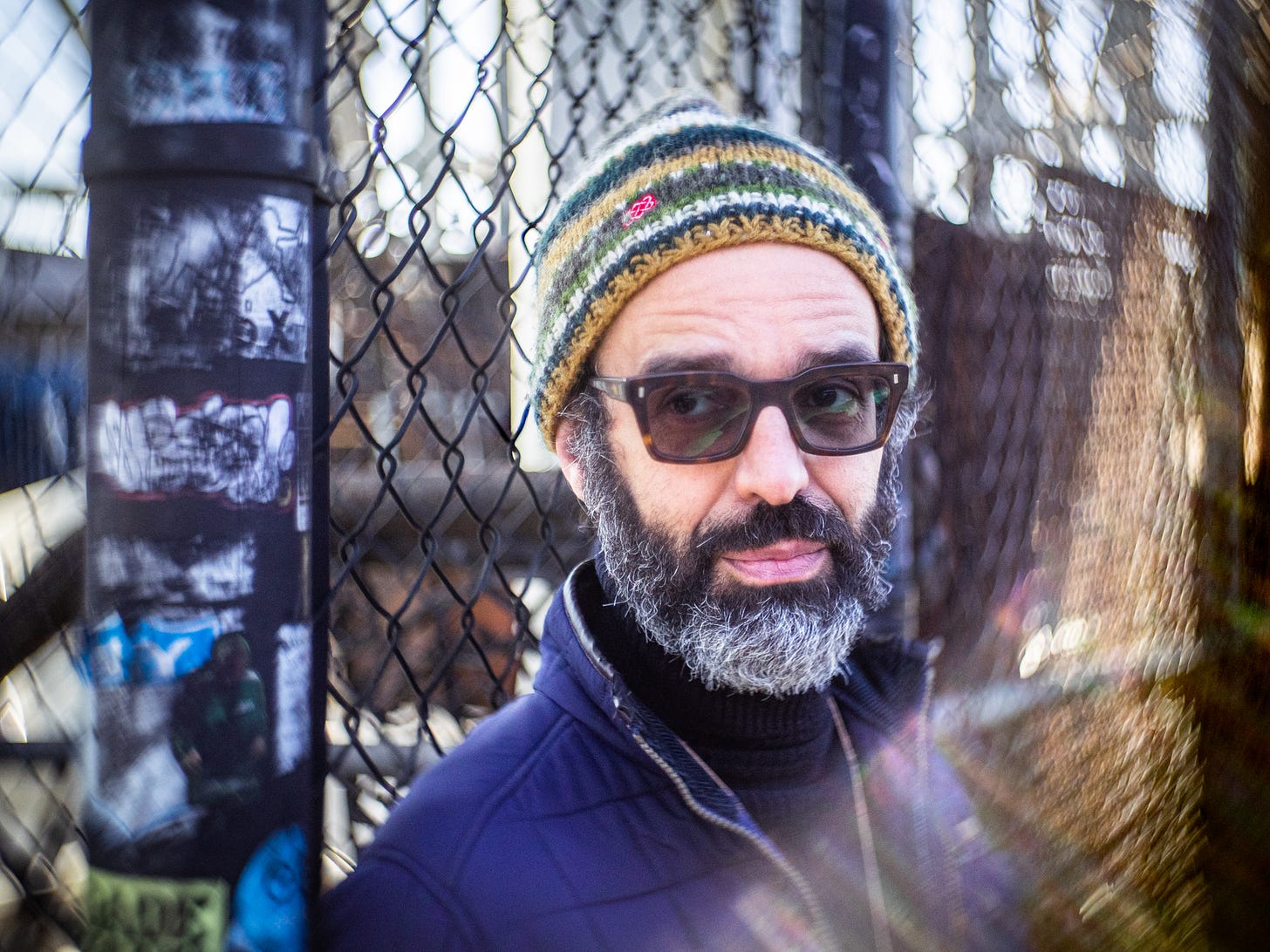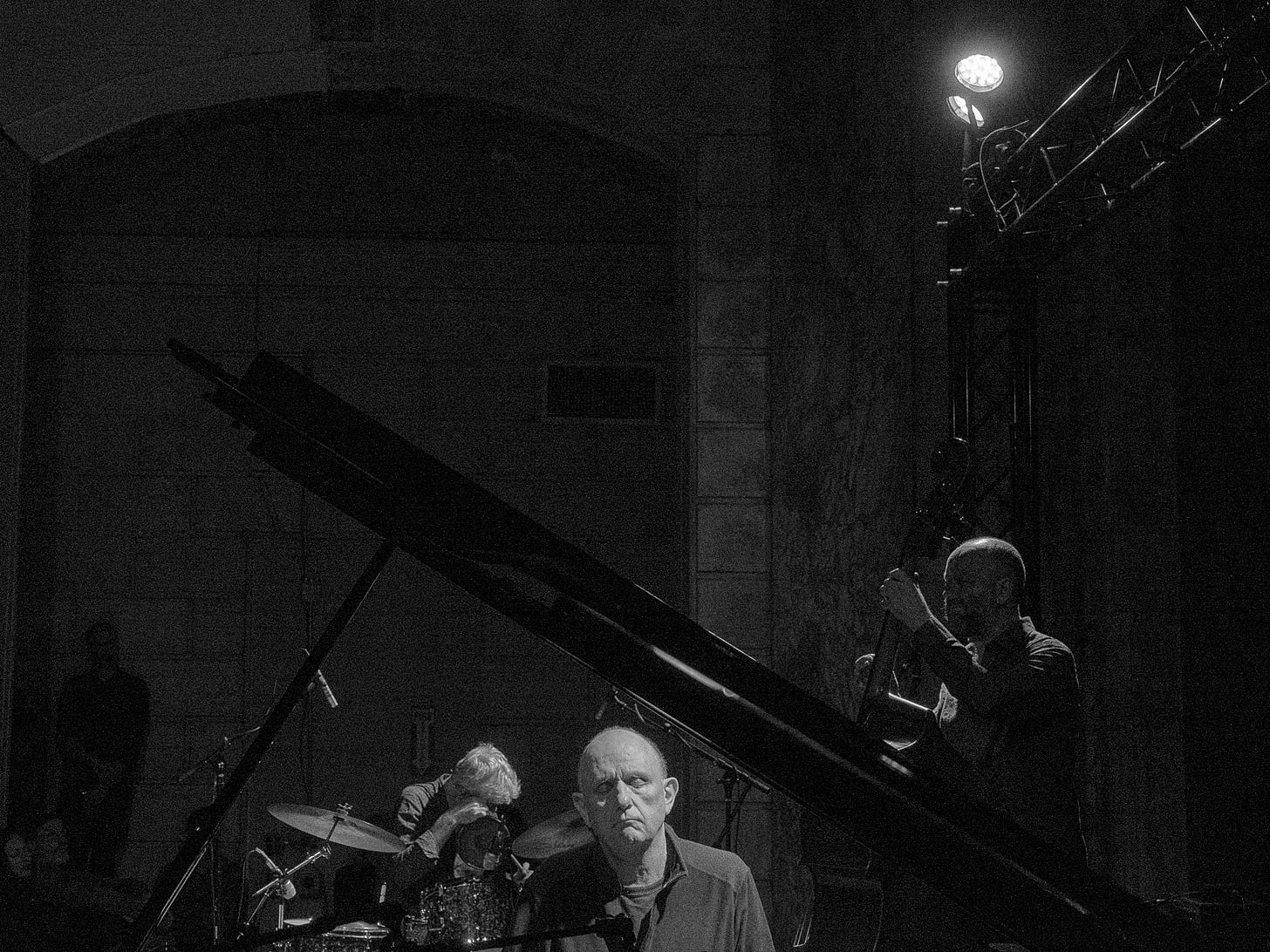Bracing for the Worst, Listening to the Best
George Lewis and International Contemporary Ensemble, Mariam Rezaei, Michaël Attias, the Necks, Sophie Agnel
Once again this week’s newsletter is a bit long, so some of the recommended show listings will likely be missing in the email edition. If that’s the case, you can find the complete listings here.
I’m wiped out but exhilarated from four amazing days of music, discussion, and friendship (old and new) at Jazzfest Berlin. And now the anxiety of what’s going to transpire this week in the US has unfortunately taken over my brain. There’s a ton of shit happening here again this week, and I hope my mood isn’t too depressed to take in as much in as I can. I got confirmation that my overseas ballot was received a couple of weeks ago. I’m pretty freaked out about what could come, further accelerating the disturbing, cruel transformation of the US that was kickstarted by the election of 2016. But most people I know and care about are doing all they can to resist, which includes the musicians creating work that defies the kind of tribal thinking that’s become so destructive all around the world.
George Lewis, one of the most inspiring, relentless, and erudite agents for change is in town all week, overseeing a raft of concerts and discussions at the Haus der Kulturen der Welt, titled “Always, Already There: An Incubator for Afrodiasporic New Music.” Since Lewis became artistic director of International Contemporary Ensemble in 2022 he’s transformed the group into a living corrective, shifting its focus to work created by Black artists, but also educating listeners—to say nothing of hardcore classical musicians—about the intricacies and vitality of improvisation, and passionately championing a global network of artists almost entirely dismissed by institutional power that’s as much about pedigree and geography as it is about skin color. In recent years Lewis has embraced the term “polyaspora,” a kind of deeply holistic acknowledgement that decenters contemporary music from any given location or methodology, and that sort of thinking characterizes this week’s events. You can find a rundown of the entire program here, but I’m heartened to see the event devoted to the music of AACM veteran Douglas R. Ewart that originated in New York last year resurfacing in Berlin on Saturday, November 9, with a cast mixing ICE fixtures like Rebekah Heller, Jacob Greenberg, Joshua Rubin, and Levy Lorenzo, and new members rooted in improvised music like trumpeter Jonathan Finlayson, along with guest singers Elaine Mitchener and Damian Norfleet.
The opening concert on Thursday, November 7 focuses on electronics, both on its own and as part of ensemble pieces including work from Berlin-based artists Christina Wheeler and Cedrik Fermont. The program for the concert on Friday, November 8, named “Composing While Black” after the book edited by Lewis and Harald Kisiedu, includes work by a wide variety of more academy-aligned composers including the rising South African artist Andile Khumalo, Swiss percussionist-composer Jessie Cox, and Swiss-based Nigerian composer Charles Uzor. The closing program, on Sunday, November 10, seems to be built around a hybridity of materials and styles, with a new work from Berlin-based electronic composer Jessica Ekomane, a movement piece from vocalist and recent ICE member Fay Victor, and a couple of German premieres of pieces by Mitchener.
Mariam Rezaei Keeps it Spinning
Among the many highlights of this past week’s Jazzfest Berlin was the local debut of the international quartet the Sleep of Reason Produces Monsters, which gave a bruising performance at Quasimodo on Friday, November 1. Driven by the furious drumming of Lukas König and nominally fronted by the explosive alto saxophonist Mette Rasmussen, the meat of the group’s sound comes from the trumpet and electronics of Gabriele Mitelli and the wild turntablism of Mariam Rezaei, who returns to town later this week for a solo performance that’s part of the Eavesdrop Festival, on Wednesday, November 6. It’s all organized by electronic musician Jasmine Guffond—full details in the recommended shows listings below. Rezaei has just dropped a manic new solo album called Fractured (Heat Crimes) that reveals a variety of vivid sides within her sprawling, ever-visceral practice. The album pogoes between approaches and aesthetics, opening with fucked electronics and the autotuned voice of Elvin Brandhi on the aptly titled “Weirdo club music,” which like all of the source material is simply molding clay for Rezaei. On “Going straight (and fucking it up)” tightly-coiled electro beats seethe and stutter, chopped and stretched by her ever expanding arsenal of techniques. She creates or locates an indelible phrase, twitchy groove, or bracing soundworld and runs roughshod over it, tearing it apart and reassembling with wild insouciance.
But I think my favorite stuff arrives when she works over samples of working musicians, and on that count I don’t think anything surpasses “Cut,” which you can hear below. Rezaei taped a chunk of a soundcheck by the wiry trio Mopcut (guitarist Julien Desprez, vocalist Audrey Chen, and Sleep of Reason bandmade König) and her real-time manipulation of the snippet, extended, diced, and reconfigured is a blast. She deploys an idea she calls “always falling forward,” in which she never circles back to earlier sounds from the sampled material, but instead sticks with the audio as it proceeds, screwing with it as it transpires. The piece is raw and exhilarating and reveals her growth as an improviser in a medium that often feels limited—that is until you notice what she can do with it. She embraces a similar tack on the more chill “Slipping,” building a meditation from a duo of improvised drums and guitar by König and Stewart Smith, respectively. Elsewhere she takes more minimalist routes, such as the way beating sign tones are extended and shrunken across a wonderfully destabilized expanse that piles up on itself, shifts keys, and leaves specks of pitch-shifting detritus on the table in “Sines,” which is followed by a kind of new agey cascade of sparkly synth cloudbursts (a la Suzanne Ciani) on “Vengabussed,” which borrows a melody from the Vengaboys hit “We Like to Party,” which I admittedly wouldn’t have known if the info hadn’t been included in the PR. An untreated Brandi vocal screeches through the grimy beats of “Frenzy” while Rezaei’s noisier side emerges on “Jaw,” which features frequent collaborator Evicshen helping to layer the sheets of writhing feedback and white noise. On the closing track “Animosity” Rezaei fucks with her own voice, transforming it to forge an unsettling ambient drift. The album reinforces her growing vocabulary and range of approaches, casually challenging all sorts of assumptions about what turntablism can entail.
Appreciating the Deceptively Heady Music of Michaël Attias
For more than two decades alto saxophonist and composer Michaël Attias has been an under-the-radar force on the New York jazz scene, an improviser of buoyant generosity and invention that can adapt to a wide variety of settings yet who has never quite gotten his due. I first heard years ago as a trusted colleague of cellist Fred Lonberg-Holm, working together in Anthony Coleman’s Selfhaters among other contexts. He still works with Coleman—and they both appear on the latest recording by singer Fay Victor, which I wrote about llast week—but in recent years he’s been spending much of his time in Berlin, where I’ve had the chance to engage more directly with his playing. Although he has an impressive discography as a bandleader, he seems to often function as a free agent, elevating just about any project he participates in, but not really maintaining any solid working bands, at least in Berlin. When he does lock in with regular colleagues there’s no missing the rigor of playing and writing.
On Thursday, November 7 at Donau115 he will perform with a new Berlin quartet he’s calling Kardamom Spring, its name a tweak on his recently released album Kardamom Fall, the second of two superb recordings released on Out of Your Head this year. Back in March he dropped LuMiSong, where he’s supported by drummer Mark Ferber, keyboardist Santiago Leibson, and bassist Matt Pavolka (cellist Christopher Hoffman appears as a guest on the last of the four tracks). Kardamom Fall features Leibson with drummer Tom Rainey and bassist Sean Conly. The earlier album feels a bit more springy and energetic, while the second recording is more ruminative and moody, although there are clear continuities between them. The Berlin lineup features vibraphonist Evi Filippou, bassist Miles Perkin, and Belgian drummer Samuel Ber. The music on both albums—which are packaged together as a double CD—is harmonically dense and structurally ambitious within a post-bop model, but for the material to realize its full potential it requires a dedicated group of players, which is certainly the case on the recordings and whenever I’ve seen Attias lead groups in Berlin. But these configurations are always changing—along with the repertoire—and that might explain why he hasn’t achieved greater recognition over the years. Below you can hear “#63 (Settled),” the opening track from LuMiSong.
I’ve been spending a fair amount of time with both recordings, but I feel like I’m still processing the music, which reveals its secrets slowly, masking sophisticated interplay and harmonic movement beneath consistently attractive melodies, both brooding and airy. In his thoughtful liner note essay for Kardamom Fall writer Jim Macnie explains:
Attias cites Ornette’s “Lonely Woman,” Monk’s radiant ballads, and parts of Andrew Hill’s book as examples of work that simultaneously renders multiple moods, quickly adding Janáček, Berg, and a scad of Brazilian music to the list.
Indeed, that sort of meditative, reflective vibe characterizes most of the album, which one can certainly deduce from the tune “Avrils,” below. As thorny and intricate as the recording is, when the saxophonist performs live he always seems to bring a heightened clarity to the proceedings, injecting an edge that’s not always as apparent in the studio. Attias has also released a new duo album with pianist Simon Nabatov called Dream Walks (Fundacja Słuchaj), a fully improvised session that demonstrates the reedist’s ability to nail more abstract, open-ended situations just as well as he maps out elaborate compositional settings.
The Necks: the More Things Stay the Same, the More They Change
In most ways Bleed (Northern Spy), the latest album in the long history of the Necks, carries on with the trio’s modus operandi: one of the band members improvises a little phrase or gesture, and the other two join in, shape-shifting spontaneous sounds over the course of an hour or so. Naturally, over time there have been all sorts of exceptions and shifts: sometimes an album will contain a number of shorter pieces and/or studio-work allows them to retool, overdub, and reshape the sort of one-take extended excursions of live shows. The Necks deliberately keep such details hazy because it’s ultimately not that important. What matters is surrendering to a given work, and letting it take you somewhere unexpected
.That’s certainly the case with Bleed, which might be the most meditative, low-key entry in a vast discography. Keyboardist Chris Abrahams kicks things off with a tangle of lean chords and single notes, allowing the overtones to fill in the lengthy gap between the articulated sounds. He’s in no hurry, and he seems to revel in the way the decaying tones occupy the space. Eventually some electronics add a mixture of enhanced sustained and tonal bite, transforming those sparse gestures into an ambient haze, with some tinkling bells and cymbal sizzle liming the action before percussionist Tony Buck generates some terse percussive tattoos separated by lengthy pauses, gently but persistently forging an air of pregnant tension. It’s nearly ten minutes before a recognizable bass sound from Lloyd Swanton enters the fray, and by that time Buck is overdubbing meditative electric guitar arpeggios—just as spare as the piano figures. It all happens in extreme slow motion, but there is an inexorable sense of forward movement, with the various elements getting more and more enmeshed as the clock ticks, even if it feels like the music remains as still as it was in the opening seconds, with a levitating ambience that belies the ornate detail.
As sounds expand and ricochet, some of the phrases articulated by Abrahams almost convey a cocktail jazz touch, packing an unexpected punch amid the enveloping haze. Eventually the pianist’s lines coalesce into something more direct and melodic, with Swanton following suit with spacious yet palpable bass patterns. Meanwhile Buck continues to move around contributing a wide variety of sounds, some drifty, some tightly-coiled. On the one hand it’s all rather static, but on the other it’s like a universe of delicately shaped gestures, lines, and riffs floating, colliding, and building one another. Sometimes we’re teased: in the final third of the work an insistent piano melody emerges from a rumbling din of left-handed piano, suggesting a triumphant exposition is at hand, but those expectations are quickly quashed, as the Necks continue to expand its palette, with electronically-enhanced kalimba fragments undulating against synth daubs, drum kit rumbles, and softly ringing chimes, only for that piano figure to resurface, aligned with bass, guitar, and percussion in the final moments. You can hear the entire piece below, but don’t expect to hear the same thing when the band performs at Pierre Boulez Saal on Wednesday, November 6. It’s one of Berlin’s most acoustically pristine spaces, but it doesn’t always do well with loud drums and amplified sounds. Given the trio’s vast experience, I have little reason to doubt that they’ll quickly figure out how to make it work there.
Some of the Many Sides of Sophie Agnel
I’ve been familiar with the work of French pianist Sophia Agnel for several decades, but I’m embarrassed to admit that it’s only been in the last couple of years that I’ve devoted much time to getting my head around her output. Although she has regularly participated in free jazz-like contexts, such as her excellent trio with bassist John Edwards and drummer Steve Noble, at the heart of her aesthetic is a rigorous commitment to sound for its own sake. I’ve been blown away by Un clavier bien tempéré (Scatter Archive), a recent collaboration with the great French sound artist Jérôme Noetinger—perhaps the greatest living manipulator of the Revox tape machine—in which it’s often difficult to discern who’s doing what. Agnel produces glorious rushes of gnarly prepared piano, transforming the keyboard into an abstract sound device, while Noetinger vividly processes those spontaneous gestures with tape loops, smeared and tangled. The music is deliciously raw and in-your-face, but it never resorts to sonic violence or numb noise, instead reveling in a sprawling range of texture and color, heavily abraded, explosive, and surprising. Below you can check out “Hache.”
More recently Agnel released Three on a Match (Otoroku), her third album with Edwards and Noble, and as anyone who’s familiar with this rhythm section knows, the line between hovering abstraction and driving propulsion is irrelevant here. The opening section favors the former, with Edwards producing creaky arco sparks, Noble skittering across drum rims and stridently bowing cymbals, while Agnel toggles between prepared piano thrums and clearly articulate chords, as the trio seems to gather itself, testing waters, and finding a unified thread that emerges in the lengthy middle section of the album, which you can check out below. That’s not to say the group turns into a jazz piano trio, but the music becomes more active, tactile, and insistent. The music was recorded live over two evenings at Café Oto last summer, and the excellent fidelity captures the roiling intensity in full splendor
On Sunday, November 10 Angel arrives in Berlin for a duo concert with Chicago percussionist Michael Zerang at Industriesalon Schöneweide, and from the music featured on a forthcoming album by them called Draw Bridge (Relative Pitch), the context allows the pianist to straddle these two sides (although it would be erroneous to suggest some stark polarity between her approach on the two above recordings). Zerang focuses on a lot of frictive sounds here, creating creaking, ominous environments that when paired with Angel’s highly physical sounds conjures the sound world of an old ship rocking to-and-fro on a stormy sea. I’d hesitate to call any of it industrial, but there’s an evocation of a pre-electronic factory, with tools, raw materials, and repeated motion suggesting the sound of labor. I’ve only had the chance to listen to the album once, so I’m not doing the music justice—it’s great—but Agnel and Zerang do carve out an attack that feels pretty special. Below you can check out a piece called “Arch.”
Recommended Shows in Berlin This Week
November 5: Kali Malone presents All Life Long with Stephen O'Malley, Macadam Ensemble, Elena Kakaliagou, Johannes Lauer, Magnus Schriefl, Rike Huy, Weston Olencki, 8 PM, Kaiser-Wilhelm-Gedächtniskirche, Budapester Straße 50, 10789 Berlin
November 6: The Necks (Chris Abrahams, keyboards, Tony Buck, drums, and Lloyd Swanton, bass), 7:30 PM, Pierre Boulez Saal, Französische Straße 33d, 10117 Berlin
November 6: Meshell Ndegeocello; Aja Monet; Jake & Abe, 7:30 PM, Musikbrauerei, Greifswalder Straße 23a, 10405 Berlin
November 6: Eavesdrop Festival: Mariam Rezaei; Audrey Chen & Hugo Esquinca; Rashad Becker; DJs Oren Ambarchi & crys cole, 8 PM, Betonhalle, Silent Green, Gerichtstraße 35, 13347 Berlin
November 6: Kali Malone presents All Life Long with Stephen O'Malley, Macadam Ensemble, Elena Kakaliagou, Johannes Lauer, Magnus Schriefl, Rike Huy, Weston Olencki, 8 PM, Kaiser-Wilhelm-Gedächtniskirche, Budapester Straße 50, 10789 Berlin
November 7: Meshell Ndegeocello; Samora Pinderhughes; Jake & Abe, 7:30 PM, Musikbrauerei, Greifswalder Straße 23a, 10405 Berlin
November 7: Eavesdrop Festival: Ilpo Väisänen; Nina Garcia; Mat Pogo; Nima Afghiani; DJ Jessica Ekomane, 8 PM, 8 PM, Betonhalle, Silent Green, Gerichtstraße 35, 13347 Berlin
November 7: Lucie Vítková performs Earth Eater and Environment (for accordion feedback, harmonica and voice), 8:30 PM, KM28, Karl Marx Straße 28, 12043 Berlin
November 7: Decolonializing Electroncis: International Contemporary Ensemble with Cedrik Fremont, Christina Wheeler, Satch Hoyt, and Corie Rose Soumah (Corie Rose Soumah, Satch Hoyt, Levy Lorenzo & Fay Victor, Christina Wheeler, and Cedrik Fremont), 8:30 PM, Haus der Kulturen der Welt, John-Foster-Dulles-Allee 10, 10557 Berlin
November 7: Michaël Attias Kardomom Spring (Michaël Attias, alto saxophone, Evi Filippou, vibraphone, Miles Perkin, bass, and Samuel Ber, drums), 8:30 PM, Donau115, Donaustraße 115, 12043 Berlin
November 7: BANDÃ (Carla Boregas, synth, electronics, Marina Cyrino, alto flute, piccolo, Marcela Lucatell, piano, voice, Juliana Perdigão, clarinets, voice, and Mariá Portugal, drums, voice, 8:30 PM, Morphine Raum, Köpenicker Straße 147, 10997 Berlin (Hinterhof 1. Etage)
November 7: Emmeluth’s Amoeba (Signe Emmeluth, alto saxophone, Karl Bjorå, guitar, Isach Skeidsvoll, piano, and Ole Mofjell, drums), 8:30 PM, Sowieso, Weisestraße 24, 12049 Berlin
November 8: ONCEIM Chamber (Juliette Adam, clarinet, Martine Altenburger, cello, Frédéric Blondy, piano, Fabrice Charles, trombone, Bertrand Denzler, tenor saxophone, Vianney Desplantes, euphonium, Antonin Gerbal, percussion, Jean-Philippe Gross, electronics, Clara Levy, violin, Jean-Sébastien Mariage, guitar, Julia Robert, viola, and Joris Rühl, clarinet), 8 PM, Exploratorium, Zossener Strasse 24, 10961, Berlin
November 8: Oceans Roar 1000 Drums (Todd Capp, drums, Andrew Lafkas, double bass, Bryan Eubanks, saxophone, electronics, Xavier Lopez, synth) with guest Derek Shirley, double bass, 8:30 PM, Kühlspot Social Club, Lehderstrasse 74-79, 13086 Berlin
November 8: Composing While Black, Berlin Edition: International Contemporary Ensemble (Alyssa Regent, Nyokabi Kariũki, Jalalu-Kalvert Nelson, Leila Adu-Gilmore, Corie Rose Soumah, Hannah Kendall, Andile Khumalo, Charles Uzor, and Jessie Cox), 8:30 PM, Haus der Kulturen der Welt, John-Foster-Dulles-Allee 10, 10557 Berlin
September 9: Stiebler & Scelsi: Jon Heilbron, double bass, Joe Houston, piano, Dylan Kerr, voice, Rebecca Lane, flutes, and Weston Olencki, trombone, play Ernstalbrecht Stiebler and Giacinto Scelsi, 8:30 PM, KM28, Karl Marx Straße 28, 12043 Berlin
November 9: Oceans Roar 1000 Drums (Todd Capp, drums, Andrew Lafkas, double bass, Bryan Eubanks, saxophone, electronics, Xavier Lopez, synth) with guest Carina Khorkhordina, trumpet, 8:30 PM, Sowieso, Weisestraße 24, 12049 Berlin
November 9: Music of Douglas R. Ewart: Sonic Networks with International Contemporary Ensemble (Damian Norfleet, voice, Fay Victor, voice, Joshua Rubin, clarinet, Rebekah Heller, oboe, Jonathan Finlayson, trumpet, Jacob Greenberg, keyboard, Levy Lorenzo: percussion) with Elaine Mitchener, voice , 8:30 PM, Haus der Kulturen der Welt, John-Foster-Dulles-Allee 10, 10557 Berlin
November 9: Eiko Ishibashi x Ryûsuke Hamaguchi: Gift, Eiko Ishibashi performs her live score to the film, 8 PM, HAU1, Stresemannstr. 29, 10963 Berlin
November 10: Sophie Agnel, piano, and Michael Zerang, percussion; Alexander Frangenheim, bass, and Patrick Crossland, trombone, 3:30 PM, Industriesalon Schöneweide, Reinbeckstraße 10, 12459 Berlin
November 10: Die Hochstapler (Louis Laurain, trumpet, Pierre Borel, alto saxophone, Antonio Borghini, bass, Hannes Lingens, drums), 8:30 PM, Kühlspot Social Club, Lehderstrasse 74-79, 13086 Berlin
November 10: The Wide-Open Mouth: Com Chor Berli, Shelly Phillips, conductor, Jessica Ekomane, and International Contemporary Ensemble (Jessica Ekomane, Elaine Mitchener, Njabulo Phungula, Fay Victor, Anthony R. Green, Monthati Masebe, Shelly Phillips), 8:30 PM, Haus der Kulturen der Welt, John-Foster-Dulles-Allee 10, 10557 Berlin
November 11: Mabe Fratti; Military Genius, 8 PM, Kuppelhalle, Silent Green, Gerichtstraße 35, 13347 Berlin






Hey, Peter, just want to say what a comfort and source of inspiration the newsletter has been for me over the last year or so. It's been a real shit sandwich of a week for a lot of us, but I look forward to these missives more than just about anything.